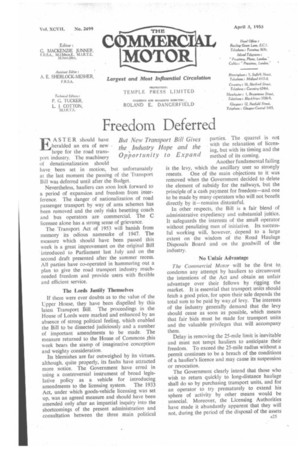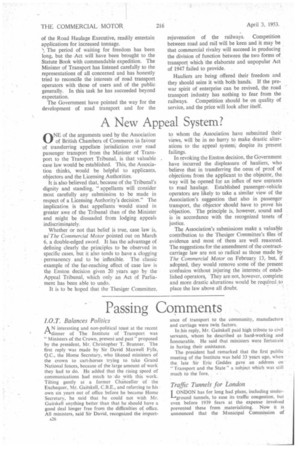Freedom Deferred E ASTER should have heralded an era of new
Page 27

Page 28

If you've noticed an error in this article please click here to report it so we can fix it.
hope for the road transport industry. The machinery of denationalization should have been set in motion, but unfortunately at the last moment the passing of the Transport Bill was deferred until after the Budget.
Nevertheless, hauliers can soon look forward to a period of expansion and freedom from interference. The danger of nationalization of road passenger transport by way of area schemes has been removed and the only risks besetting coach and bus operators are commercial. The C licensee alone has a strong sense of grievance.
The Transport Act of 1953 will banish from memory its odious namesake of 1947. The measure which should have been passed this week is a great improvement on the original Bill introduced to Parliament last July and on the second draft presented after the summer recess. All parties have co-operated in hammering out a plan to give the road transport industry muchneeded freedom and provide users with flexible and efficient service.
The Lords Justify Themselves If there were ever doubts as to the value of the Upper House, they have been dispelled by this latest Transport Bill. The proceedings in the House of Lords were marked and enhanced by an absence of strong political feeling, which enabled the Bill to be dissected judiciously and a number of important amendments to be made. The measure returned to the House of Commons ,this week bears the stamp of imaginative conception and weighty consideration.
Its blemishes are far outweighed by its virtues, although, quite properly, its faults have attracted more notice. The Government have erred in using a controversial instrument of broad legislative policy as a vehicle for introducing amendments to the licensing system. The 1933 Act, under which goods-vehicle licensing was set up, was an agreed measure and should have been amended only after an impartial inquiry into the shortcomings of the present administration and consultation between the three main political But New Transport Bill Gives Parties. The quarrel is not the Industry Hope and the with the relaxation of licens Opportunity to Expand method of its coming.
Another fundamental failing is the levy, which the ancillary user so strongly resents. One of the main objections to it was removed when the Government decided to delete the element of subsidy for the railways, but the principle of a cash payment for freedom—and one to be made by many operators who will not benefit directly by it—remains distasteful.
In other respects, the Bill is a fair blend of administrative expediency and substantial jukice. It safeguards the interests of the small operator without penalizing men of initiative. Its successful working will, however, depend to a large extent on the wisdom of the Road Haulage Board and on the goodwill of the Disposals industry. No Unfair Advantage The Commercial Motor will be the first to, condemn any attempt by hauliers to circumvent the intentions of the Act and obtain an unfair advantage over their fellows by rigging the market. It is essential that transport units should fetch a good price, for upon their sale depends the total sum to be paid by way of levy. The interests of the industry generally demand that the levy should cease as soon as possible, which means that fair bids must be made for transport units and the valuable privileges that will accompany them.
Delay in removing the 25-mile limit is inevitable and must not tempt hauliers to anticipate their freedom. To exceed the 25-mile radius without a permit continues to be a breach of the conditions of a haulier's licence and may cause its suspension or revocation.
The Government clearly intend that those who wish to return quickly to long-distance haulage shall do so by purchasing transport units, and for an operator to try prematurely to extend his sphere of activity by other means would be unsocial. Moreover, the Licensing Authorities have made it abundantly apparent that they will not, during the period of the disposal of the assets of the Road Haulage Executive, readily entertain applications for increased tonnage.
The period of waiting for freedom has been long, but the Act will have been brought to the Statute Book with commendable expedition. The Minister of Transport has listened carefully to the representations of all concerned and has honestly tried to reconcile the interests of road transport operators with those of users and of the public generally. In this task he has succeeded beyond expectation.
The Government have pointed the way for the development of road transport and for the rejuvenation of the railways. Competition between road and rail will be keen and it may be that commercial rivalry will succeed in producing the division of function between the two forms of transport which the elaborate and unpopular Act of 1947 failed to provide.
Hauliers are being offered their freedom and they should seize it with both hands. If the prewar spirit of enterprise can be revived, the road transport industry has nothing to fear from the railways. Competition should be on quality of service, and the price will look after itself.




























































































